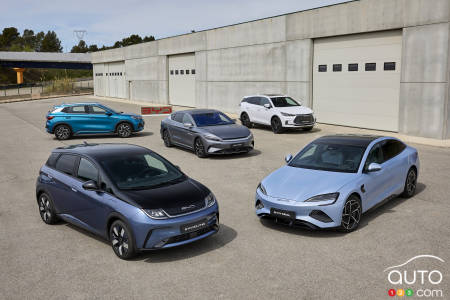The Chinese market has grown so much in the last 10 years that it can no longer be ignored. In the past, if a carmaker did brisk business there, so much the better. Today, for many brands, China as a market is a necessity for companies’ looking to keep a healthy bottom line. That’s even more so at a time when astronomical sums are being invested in electrification.
For BMW and Mercedes-Benz, 2024 is a worrying year for their Chinese operations. Third-quarter sales fell sharply due to falling demand and fierce competition in China itself.
The German automotive sector is facing a number of challenges, from high production costs and managing the transition to electric vehicles, to the decline in demand and growing competition from Chinese manufacturers.
The difficulties faced by some automakers were recently illustrated by cost-cutting announcements from Europe's largest automaker. Volkswagen is even considering closing plants in Germany, for the first time.
BMW and Mercedes-Benz: Ugly numbers
For the quarter just ended (July-September), global sales fell by 13 percent for BMW and 3 percent for Mercedes-Benz.
In China, the decline was 30 percent for BMW and 13 percent for Mercedes-Benz. And it was the top-of-the-range models that saw their sales melt away the most, particularly Mercedes-Benz with the S-Class.
Reuters reports that BMW did not provide any details regarding the performance of its top luxury models in China, but it did indicate that worldwide sales of its Rolls-Royce models fell by 16 percent, while its Mini brand suffered a 25-percent drop.
Mercedes notes that the global market for electric vehicles is sluggish, with the company reporting a 31 percent drop in sales in that sector. The picture is rosier at BMW, which reported a 10 percent increase in sales of all-electric models during the third quarter.

The other factor to consider is commercial competition. The European Union recently imposed high tariffs on Chinese-made electric vehicles (as did the U.S. and Canada), claiming that they benefited from unfair government subsidies. The Chinese government denies this and has threatened retaliatory measures.
This does not bode well for German automakers, who make around a third of their profits in China. China is considering raising tariffs on imports of large vehicles, which would affect German automakers. German exports of models with engines of 2.5L or more to China reached $1.2 billion last year.
Shares in BMW and Mercedes remained stable following the release of sales data.
The companies cut their annual forecasts in September, citing a difficult Chinese market. Year-to-date, BMW and Mercedes shares are down 23% and 9% respectively.
We can expect a lot of action over the next few months.





